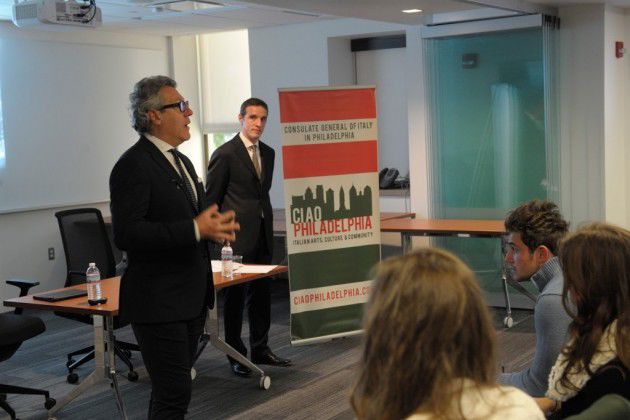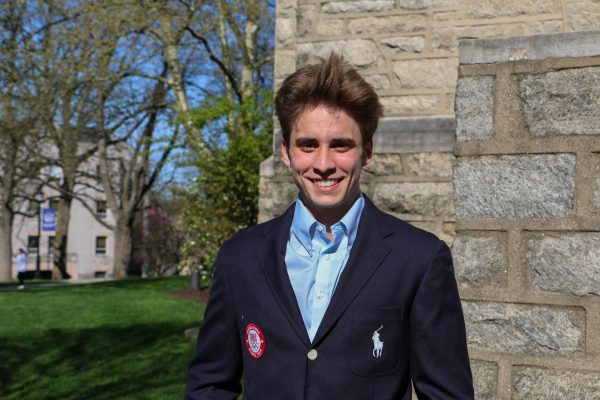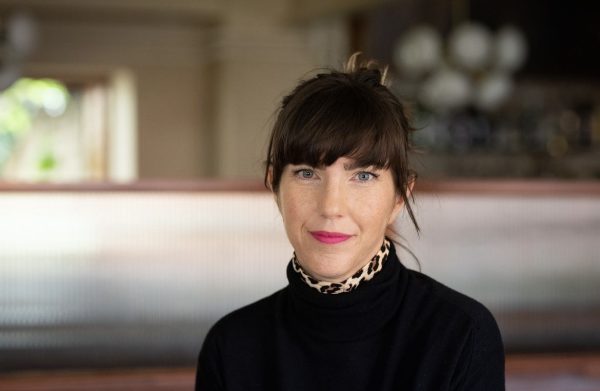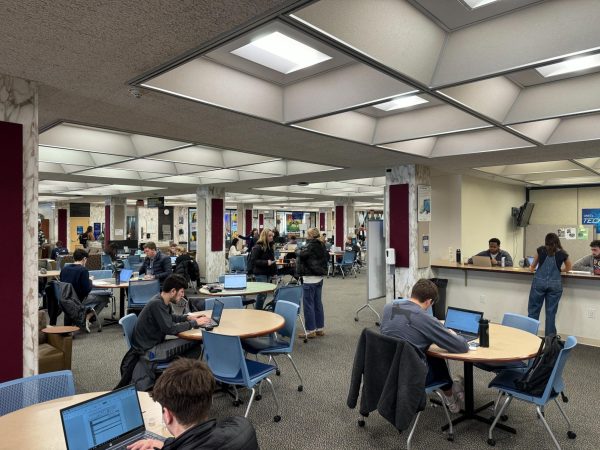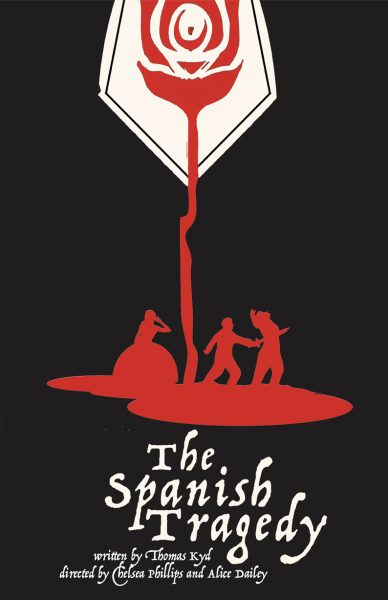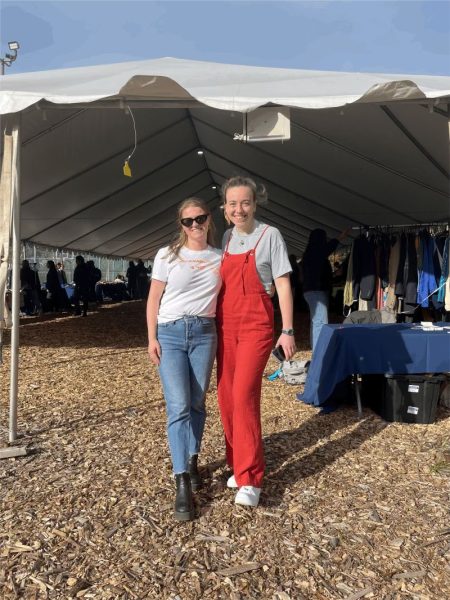Italian Studies Program brings taste of culture to campus
November 17, 2015
There is a low murmur among the crowd in the densely packed room. As a matter of fact there isn’t a single open seat; it is standing room only. Short Italian phrases whiz by, a staccato of laughter erupts. The walls are covered in bright post-it notes. Some are prompted by the statement “recommend a book.” Others are ideas for a recently initiated project.
The Center for Innovation, Creativity & Entrepreneurship is a hub of energy on campus. Regularly filled with students from all colleges, it is a place for the University’s best and brightest to let their imaginations run wild as they use their passion to maximize their talents.
“The Institute has a multi-disciplinary focus, and we seek to facilitate cross-college learning and entrepreneurship,” Eamon Gallagher, the ICE Institute’s assistant director said. “At the moment we have a great variety of projects under way, like the development of a few different medical devices, but tonight we are hosting a presentation called ‘The Difference Italy Makes.’”
On this night the Institute took a respite from serving as the University’s principal idea incubator and instead hosted the third of a four part series initiated by Luca Cottini, a professor of Romance Languages in the College of Liberal Arts and Sciences. The series spans three months, from October to December, and covers everything from high-end Italian fashion to Italy’s response to the global financial crisis of 2008, with the intention of presenting viewers a comprehensive view of Italian culture.
“Cultural appreciation doesn’t come from simply reading a book,” Cottini said. “It requires literary immersion, architectural appreciation, artistic exposure, business acumen, and everything in between. It is a dynamic expression of life. We don’t want to venerate the past and neglect the present, or vice versa, but to combine the two for true understanding.”
Fernando Aspesi, vice-president-senior advisor Group Quality Novartis, stands in front of the packed room. With salt-and-pepper hair combed to the side, a deep blue blazer, grey slacks and well-worn black slip in shoes, he begins to speak in a slow, relaxed Italian drawl. On this night he delivers a speech entitled, “Between Science and Management. An Italian in the Global Pharmaceutical Industry.”
He begins by graciously thanking Cottini for initiating this series and the ICE Institute for hosting the event. He plans to address three topics in his talk: Italy’s contribution to the sciences, his journey as a scientist developing compounds to a manager with a vast purview, concluding with Italy’s positioning in the global pharmaceutical industry.
There have been 12 Nobel prizes awarded to Italian scientists who have studied everything from wave transmissions, which served as the foundation for the modern radio, to atomic energy and nerve growth factors in the brain. Aspesi points out that Italy’s storied scientific history encompasses more than the findings of Leonardo Di Vinci and Galileo Galilei, but that the last century has seen revolutionary developments come from the work of great Italian scientists.
Aspesi’s own educational and professional background closely resembles that of modern science students. After an extensive higher education career, he graduated with a doctorate in organic chemistry from the Universita degli Studi di Milano and has since spent 38 years in the pharmaceutical industry.
Aspesi considers himself a global citizen and a pharmaceutical veteran. He’s worked on compounds targeting everything from typhoid fever and mad cow disease to breast cancer and the common allergy medicine, Allegra. His success in the lab allowed him to begin his ascent from bright scientist to global manager. Along the way he’s traveled the world and learned a thing or two about management.
He says he believes in empowering his employees and always keeping the ultimate goal in mind: to prevent illness. He also offered skills that have allowed him to be successful: aspire to great things, think broadly, be decisive, and develop yourself and the people around you. “Life is in front of us, the sky is the limit,” Aspesi emphasizes.
Italy currently ranks third in the European pharmaceutical market, with an output of $1.4 billion, behind only Germany, $6 billion and Switzerland, $5 billion. Aspesi concluded by briefly addressing the national status of Italy. The “brain-drain” is present, to an extent, he says. According to Aspesi, the education system is strong, citing a number of successful Italian professionals to corroborate his statement. But there are few opportunities for those who want to do similar work, simply because the money is elsewhere, and Italy continues to deal with globalization. Recently there has been a flight of manufacturing jobs and the tax system presents a challenging competitive landscape. There has also been a massive technological shift towards China and India. “What they’ve been able to do in the last 20 years took the rest of the world a century to accomplish,” he said.
After a humble wave of his hand to indicate he has heard enough applause, Aspesi offers his principal intentions for the evening.
“I wanted those present to understand that science supports culture, and vice versa,” Aspesi said. “We can’t have one without the other and we can’t study something in a bubble. I wanted to present the positive aspects of the Italian culture – there are many things Italy excels at and the culture has much to offer.”
“I enjoyed this talk,” Thomas Longo, a freshman Physics major, said. “This series has provided an introduction to Italian culture and what it’s accomplished in the modern century. It’s been valuable, because we often hear about Italy only from a historical perspective.”
Cottini’s efforts and intentions in initiating this series align well with the true intention of a university. By providing a platform for students and community members an opportunity to come together, regardless of their personal or academic backgrounds, and discuss a single idea is a true manifestation of this mission and a unifying factor on college campuses.
This series will conclude on Dec. 1 at 6 p.m. in the Driscoll Auditorium with a talk entitled “Italy and the European Crisis. A Financial Overview,” led by Enrico Dallavecchia, Senior Managing Director at Headwaters SC and Arrigo Sadun, President of TlSG-International and former Executive Director of the International Monetary Fund.

